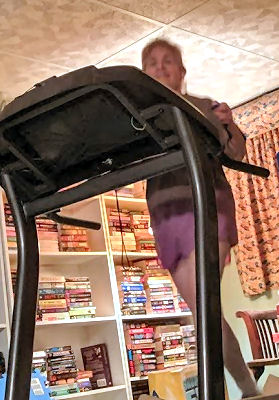Running is unfailingly hard for me. Every day that I step on the treadmill, it’s hard. It’s a struggle to increase that speed when all I want to do is lie down and take a nap. What do you do when part of your brain says, “Go!” and the other part says, “No?” How do you maintain your motivation to do something hard?
Why run at all?
If it’s so hard, you might ask, why do I want to run at all? I’ve mentioned my dogs lots of times here. They’re my workout and life buddies. My companions who never tell me I can’t do anything. My dogs are with me as I work, and often as I play. I train my dogs for fun and for competition. I write about the journeys I’ve had with my dogs, in life in general and on the road. The hard times and the fun times as I wrote about in Tango: Transforming My Hellhound.
I enjoy the competition training, and there’s nothing more fulfilling than running straight out on an Agility course with my dog. When he’s off-lead. I know that I’ll never be as fast as my dog – no human can match the speed of a canine – but I can be where I need to be, to give him the cues he needs to know where to go. And for that I need to run. Fast. That’s my motivation to get on the treadmill. So I run at home on my treadmill a couple of times a week. And it’s hard, every time. And yet, I still aim to increase the speed without decreasing the incline.
Why do something so hard, then?
So, why not decrease the speed or the incline, or both? In my mind, that would be cheating. Speaker, author and coach Curt Rosengren says, “The more you challenge yourself and succeed, the greater your confidence in your ability to do it again next time. Challenge doesn’t just help you grow your skills and knowledge, it helps you grow your belief that you can.” Small gains everyday help me stay on the treadmill. Another 10 seconds at a tenth of a mile faster is a win for me. Or an extra 30 seconds at a half percent higher incline is good. Small steps make the big goal more approachable. That kind of optimism will grow your resilience, and it’s good for your healthy aging.
Make hard stuff a habit
If you do things at a specific time on specific days for several weeks, they become a habit. When things become habit, you don’t even have to think about doing them, you just do. So, if you do something hard just as a matter of course, it will stop being hard. And then you’ll have to find some other hard thing to do.

